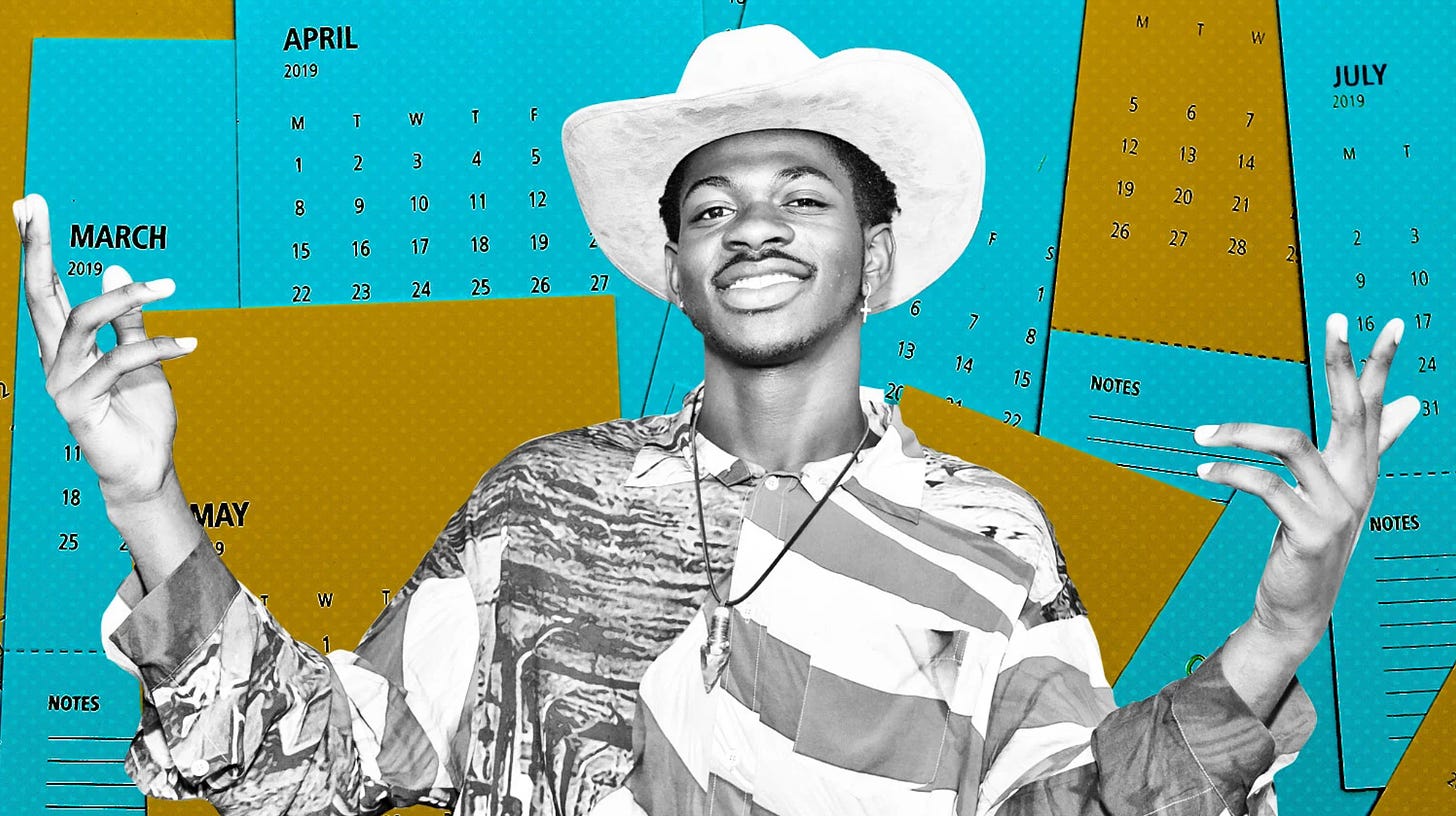#21 - 7 Habits of Highly Effective Creators: Consistent production
Lessons we can apply to be consistent in our own lives
Welcome! ☕ I write about the ideas, products, and tech advancing the creator economy. Subscribe to get future editions in your inbox every few weeks.
Dear subscribers,
The power law, which results in a small number of winners who extract the majority of value in an ecosystem, is all around us. Google’s staggering 92% global market share in search (vs. Bing’s 3% market share in 2nd place) is a clear example of this. This pattern can be seen in music, sports, business, and just about every other arena.
Likewise, top creators earn significantly more than average creators. So what sets top creators apart from the rest? What can we learn from them?
Top creators have 7 key habits that improve their odds of success in an extremely competitive field:
1. Consistent production
2. Sweat the right details
3. Know your audience
4. Scaling output
5. Creating is combining
6. Embrace different mediums
7. Enjoy the process
Over the coming weeks/months, I’ll dive into one of these habits in each post, starting today with why and how to produce consistently.
Consistent production
Why produce consistently?
Consistency hones skill faster. Conceptually, most people understand that humans learn fastest by doing. But when it comes down to it, lots of us end up spend hours watching, planning, talking, instead of practicing and doing.
Content creation is not learned on the sidelines (or by consuming), it is learned by doing the creative work over and over.
Successful creators produce consistently. Sometimes they succeed and gain momentum. But more often, they fail and learn how to improve. In any case, they gain valuable experience for tomorrow. Get the reps, and skills will follow.
“Ever tried. Ever failed. No matter. Try Again. Fail again. Fail better.”
— Samuel Beckett
Consistency shows commitment to the craft and to your audience.
When creators stick with a consistent production commitment, it proves to the world (and to themselves) that they will show up when they say they will.
A creator’s habit and commitment can lead to consumer’s habit and commitment. Knowing when a creator will share a new podcast, post a video, or go live will help consumers to reserve time in their busy lives. Staying consistent week after week breeds the kind of trust that lets creators earn loyal audiences.
Twitch’s creator camp calls out consistency as one of the basics for all streamers for good reason. If you consistently show up with valuable content, conversations, and experiences, your audience will thank you and reward you.
Consistency removes “perfection” as an excuse. We’ve all done it. We get inspired and pumped up to do something awesome. And then we wait. We wait for the perfect moment, an ideal window of opportunity where stars align so we can start doing the thing. Before you know it, months pass by and all motivation is gone.
If you wait for the perfect moment, you’ll always be waiting. Don’t agonize over perfection, your creations will never be perfect :) and that’s okay!
When top creators are creating, they don’t fret over every detail. They recognize that consistent progress is more important than attaining perceived perfection. Nearly every successful YouTuber is open with the fact they are unable to accurately predict which videos will be a hit, and which ones will flop.
Consistency leads to quantity — the dirty secret behind quality.
Many world renowned artists are known for a handful of famous works. But throughout their lives, they actually produce dozens (if not thousands) of other works which aren’t as well-regarded. Failure — lots of it — is the mother of success.
Beethoven: The opening of the 5th symphony. The 6th symphony, and the chorus from the 9th symphony... 800+ musical works
Shakespeare: Hamlet, Romeo and Juliet… 40+ plays and hundreds of sonnets
Picasso: Guernica, The Weeping Woman, The Old Guitarist… 50,000+ creations
Hitchcock: The Birds, Rear Window, Vertigo, Psycho… 65 films, many TV series
We see a similar theme in contemporary examples. Lil Nas X made 4-5 songs a day for several months before creating Old Town Road, which topped the Hot 100 for 19 weeks. Before it got there though, he published countless versions of the song, tweaked melodies, lyrics, and distributed memes and challenges on Twitter, Reddit, and TikTok before the song as we know it today caught fire. Intentional quantity inevitably leads to quality.
In a parable from James Clear, we see how this same concept applies to photography.
Jerry Uelsmann, a professor at the University of Florida, divided his film photography students into two groups.
Group 1 would be graded solely on the amount of work they produced. One hundred photos would rate an A, ninety photos a B, eighty photos a C, and so on.
Group 2 would be graded only on the excellence of their work. They would only need to produce one photo during the semester, but to get an A, it had to be a nearly perfect image.
At the end of the term, he found that all the best photos were produced by Group 1. These students stayed busy taking photos, experimenting with composition and lighting, testing out various methods in the darkroom, and learning from their mistakes. In the process of creating hundreds of photos, they honed their skills.
Meanwhile, Group 2 sat around speculating about perfection. In the end, they had little to show for their efforts, only unverified theories and one mediocre photo.
Consistency is something you control. Bursts of brilliant inspiration are incredible, but these moments aren’t controlled by our actions. What we can control is to make time, show up, and go through the necessary toils to craft something you can share with the world day after day.
This kind of dedication requires sacrifice. Successful creators know that the time they spend creating content will not be spent sleeping in, enjoying their favorite games, or watching that show everyone is talking about.
Nonetheless, they must consider giving these things up to carve out time for creation. Remember: If we consume content 40 hours a week, we’re not part-time creators, we’re full-time consumers.
They always tell me: "Nobody's workin' as hard as you"
And even though I laugh it off, man, it's probably true
'Cause while all of my closest friends out partyin'
I'm just here makin' all the music that they party to— Drake
How to produce consistently
Note: I’m writing the following from the perspective of creating content, but it can be applied to any challenges we take on.
Break things down. Make impossible tasks possible by deconstructing them into solvable pieces or smaller steps. It may have been daunting for Lil Nas X to “make the number 1 hit song on the Billboard Top 100”, but it was relatively easy and natural to “find a catchy beat”, and go from there.
Focus on one thing. After breaking down your large task into smaller tasks, figure out the first thing you need to do to move toward your goal. Do it today. If it’s not something you can do quickly, write it down and put it where you will see it often, then focus on completing it within a timeline you give yourself — one todo at a time.
Make time. Block off ample time on a regular basis to make progress and go through the struggles of creating. Hold yourself accountable to showing up, and on how you utilize this time. Do not let anything override it. This time is sacred. If you let go of it, you’re gone off track from consistent production.
Commit with consequences. Give yourself a forcing function to stick to your commitment. Willpower runs out quickly and suddenly, so it can be more effective to tie your commitment to an external consequence (e.g. reputation, money, not disappointing an accountability buddy).
Build a system around it. Create the necessary routines, tasks, rewards, repercussions, milestones, and tools to form a self-reinforcing habit. Make the incentives align so that when you do the hard work, you feel rewarded. Make the system simple and repeatable, so that it becomes second nature with time.
If you enjoyed this article, Subscribe to receive future editions in your inbox, and please share the article with your people.
Have questions or topics you’d like to learn more about? Comment below or Tweet at me. Thanks and see you next time!✌️





